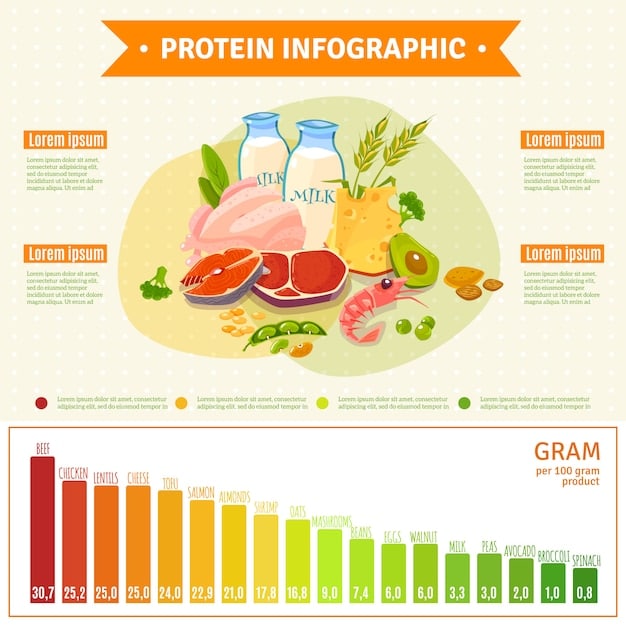Boost Metabolism 15% with 3 Nutrition Hacks (Updated 2025)

Boost Your Metabolism by 15% with These 3 Nutrition Hacks, Updated for 2025 reveals cutting-edge dietary adjustments that can significantly enhance your metabolic rate, helping you burn more calories and improve overall health, providing a practical roadmap for optimizing your body’s fat-burning capabilities.
Ready to ignite your body’s natural fat-burning furnace? Discover how to Boost Your Metabolism by 15% with These 3 Nutrition Hacks, Updated for 2025, offering practical and effective strategies for enhancing your metabolic rate and achieving your health goals.
Unlocking Your Metabolic Potential: Nutrition’s Role
Your metabolism is the engine that powers your body, converting food into energy. A sluggish metabolism can lead to weight gain, fatigue, and a host of other health issues. However, by making strategic changes to your diet, you can significantly boost your metabolic rate and unlock your body’s full potential. Let’s explore how nutrition can play a pivotal role in revitalizing your metabolism.
Understanding Metabolism and Its Influencers
Metabolism is more than just how quickly you burn calories. It’s a complex biochemical process. Several factors influence your metabolism, including genetics, age, gender, and muscle mass. While you can’t change your genetics or age, you have control over your diet and exercise habits, which can significantly impact your metabolic rate.
The Power of Thermogenesis
One key aspect of boosting metabolism through nutrition is understanding the concept of thermogenesis. This is the process of your body producing heat through digestion and metabolism. Certain foods require more energy to digest, leading to a higher thermic effect and a corresponding boost in metabolism.

- Protein Power: Consuming adequate protein increases thermogenesis, requiring more energy to digest and metabolize compared to fats or carbohydrates.
- Spice It Up: Certain spices, like chili peppers, contain compounds that can temporarily boost metabolism by increasing heat production.
- Hydrate for Health: Drinking plenty of water is crucial for metabolic processes, as dehydration can slow down enzymatic reactions involved in energy production.
By strategically incorporating foods with a high thermic effect into your diet, you can naturally boost your metabolism and support your weight management goals. Prioritizing protein, incorporating spices, and staying hydrated are simple yet powerful nutrition-based strategies to consider.
Hack 1: Protein Prioritization for Metabolic Ignition
Protein is not just for building muscles; it’s also a metabolic powerhouse. Prioritizing protein in your diet can significantly boost your metabolism due to its high thermic effect. Let’s delve into the science-backed reasons why protein should be a cornerstone of your metabolism-boosting nutrition plan.
Why Protein Reigns Supreme
Protein has a distinct advantage when it comes to metabolic enhancement. Unlike carbohydrates and fats, protein requires more energy for your body to break down and assimilate. This translates to a higher thermic effect, meaning you burn more calories simply by digesting protein-rich foods.
Optimizing Protein Intake for Metabolic Boost
To maximize the metabolic benefits of protein, it’s essential to strategically incorporate it into your diet. This involves not just the quantity of protein but also the timing and distribution throughout the day. Consider these helpful guidelines when adjusting or creating a new nutrition plan.
- Spread it Out: Distribute your protein intake evenly throughout the day, rather than consuming a large amount in a single meal.
- Lean Choices: Opt for lean protein sources like chicken breast, fish, tofu, and legumes to minimize your intake of unhealthy fats.
- Post-Workout Power: Consume protein after workouts to help repair muscle tissue and further boost metabolism.
Incorporating protein into every meal and snack can help stabilize blood sugar levels, reduce cravings, and promote satiety, all while boosting your metabolism. It’s a simple and effective strategy to improve your metabolic rate and support your overall health.
Hack 2: Strategic Carb Cycling for Metabolic Flexibility
Carbohydrates often get a bad rap in the world of nutrition, but they are a crucial energy source for your body. By strategically cycling your carb intake, you can optimize your metabolism and enhance its flexibility. Let’s explore the concept of carb cycling and its potential for metabolic benefits.
Understanding Carb Cycling
Carb cycling involves strategically varying your carbohydrate intake on different days or at different times of the day. This approach can help improve insulin sensitivity, promote fat burning, and support muscle growth. By manipulating your carb intake, you can tap into multiple physiological processes that greatly impact metabolism.
Tailoring Carb Cycling to Your Lifestyle
The key to successful carb cycling is to tailor it to your individual needs and activity levels. This will help ensure that your body effectively utilizes the carbohydrates you consume, maximizing their metabolic benefits. With simple adjustments, one can completely overhaul their metabolic activity with carbohydrates

- High-Carb Days: Schedule your high-carb days around your workouts to fuel your muscles and replenish glycogen stores.
- Low-Carb Days: On rest days, reduce your carb intake to promote fat burning and improve insulin sensitivity.
- Timing is Key: Consume the majority of your carbohydrates earlier in the day when you’re more active and your body is better equipped to utilize them.
Carb cycling can be a powerful tool for optimizing your metabolism and achieving your fitness goals. By strategically manipulating your carb intake based on your activity levels and lifestyle, you can enhance your body’s ability to burn fat and build muscle.
Hack 3: Fueling Your Gut for Metabolic Harmony
Your gut microbiome plays a vital role in your overall health, including your metabolism. By nourishing your gut with the right foods, you can promote metabolic harmony and optimize your body’s energy production. Let’s explore the connection between gut health and metabolism, and how you can fuel your gut for optimal function.
The Gut-Metabolism Connection
The trillions of bacteria residing in your gut can influence your metabolism in various ways. They can affect nutrient absorption, hormone regulation, and inflammation levels, all of which can impact your metabolic rate. Maintaining a healthy gut microbiome is essential for a thriving metabolism.
Nourishing Foods for a Healthy Gut
To fuel your gut and promote metabolic harmony, focus on incorporating a variety of fiber-rich foods into your diet. These foods provide the fuel that beneficial gut bacteria need to thrive. These bacteria support the metabolic processes required for everyday life.
Prebiotics and Probiotics for Gut Health
Prebiotics are non-digestible fibers that feed beneficial gut bacteria, while probiotics are live microorganisms that can directly populate your gut. Together, they can help improve your gut health, impacting your metabolism.
- Prebiotic Power: Include foods like onions, garlic, asparagus, and bananas in your diet to provide fuel for your gut bacteria.
- Probiotic Boost: Consume fermented foods like yogurt, kefir, sauerkraut, and kimchi to introduce beneficial bacteria into your gut.
- Fiber Focus: Prioritize whole grains, fruits, vegetables, and legumes to provide a steady stream of fiber for your gut bacteria.
By prioritizing gut health through nutrition, you can support a thriving metabolism and improve your overall well-being. Nourishing your gut with fiber-rich foods, prebiotics, and probiotics can help optimize your gut microbiome and promote metabolic harmony.
Hydration’s Hidden Role in Metabolism
Water is essential for life, and it plays a far more significant role in metabolism than many people realize. Adequate hydration is crucial for virtually every bodily function, including energy production. Let’s explore the often-overlooked connection between hydration and metabolism, and discover how staying hydrated can boost your metabolic rate.
Water’s Metabolic Influence
Water is a key participant in many metabolic processes, including the breakdown of nutrients and the transport of energy-rich molecules throughout your body. Without sufficient water, these processes can slow down, leading to a sluggish metabolism. It ensures the body is operating at it’s best capacity.
Signs of Dehydration Slowing Metabolism
Dehydration can manifest in numerous ways, and some of these signs directly impact your metabolism. Recognizing these signals can prompt you to increase your water intake and prevent a metabolic slowdown. Pay more attention if you notice any of the markers below.
- Fatigue: Dehydration can lead to fatigue and reduced energy levels, making it harder to exercise and burn calories.
- Headaches: Dehydration-related headaches can disrupt your focus and make it challenging to maintain a healthy lifestyle.
- Constipation: Water helps keep your digestive system moving smoothly, and dehydration can lead to constipation, which can negatively impact nutrient absorption and metabolism.
Prioritizing adequate hydration throughout the day can significantly impact both short and long-term. Make sure you drink water everyday.
Managing Stress for Optimal Metabolism
Chronic stress can wreak havoc on your metabolism, leading to weight gain, insulin resistance, and other health issues. Managing stress is crucial for maintaining a healthy metabolism and supporting your overall well-being. Let’s explore the connection between stress and metabolism, and discover practical strategies for managing stress to optimize your metabolic function.
The Stress-Metabolism Link
When you’re under stress, your body releases hormones like cortisol, which affect your metabolism in several ways. Cortisol can increase appetite, promote fat storage, and interfere with insulin sensitivity. Over time, chronic stress can throw your metabolism off balance.
Nutritional Strategies for Stress Reduction
Certain nutrients and dietary patterns can help mitigate the impact of stress on your metabolism. Prioritizing whole, unprocessed foods, and consuming adequate amounts of vitamins and minerals can help support your body’s stress response. Here are some nutrients to consider:
- Magnesium: Magnesium plays a role in stress regulation and can help stabilize blood sugar levels, reducing stress.
- Omega-3 Fatty Acids: Omega-3 fatty acids have anti-inflammatory properties and can help reduce the negative impacts of stress on your metabolism.
| Key Point | Brief Description |
|---|---|
| 💪 Protein Priority | Higher thermic effect; spread intake. |
| 🔄 Carb Cycling | Vary intake; high on workout days. |
| 🌱 Gut Fuel | Fiber-rich foods, pre/probiotics. |
FAQ
▼
While individual results vary, incorporating these nutrition hacks consistently can significantly enhance your metabolic rate. The 15% figure is an ambitious goal to encourage and inform the reader.
▼
Some changes, like increased energy levels, might be noticeable within a week. However, significant metabolic shifts and weight loss usually take several weeks or months of consistent effort.
▼
Generally, yes, but it’s always best to consult with a healthcare professional or registered dietitian before making significant dietary changes, especially if you have underlying health conditions.
▼
Each hack contributes to metabolic enhancement, so incorporating as many as possible is ideal. However, even implementing one or two can lead to noticeable improvements over time.
▼
Yes! It’s all about balance. These nutrition hacks should be part of a sustainable lifestyle, allowing for occasional indulgences while still prioritizing metabolic health.
Conclusion
Optimizing your metabolism through nutrition is both achievable and sustainable. By prioritizing protein, strategically cycling carbohydrates, and fueling your gut, you can significantly enhance your metabolic rate and unlock your body’s full potential.





